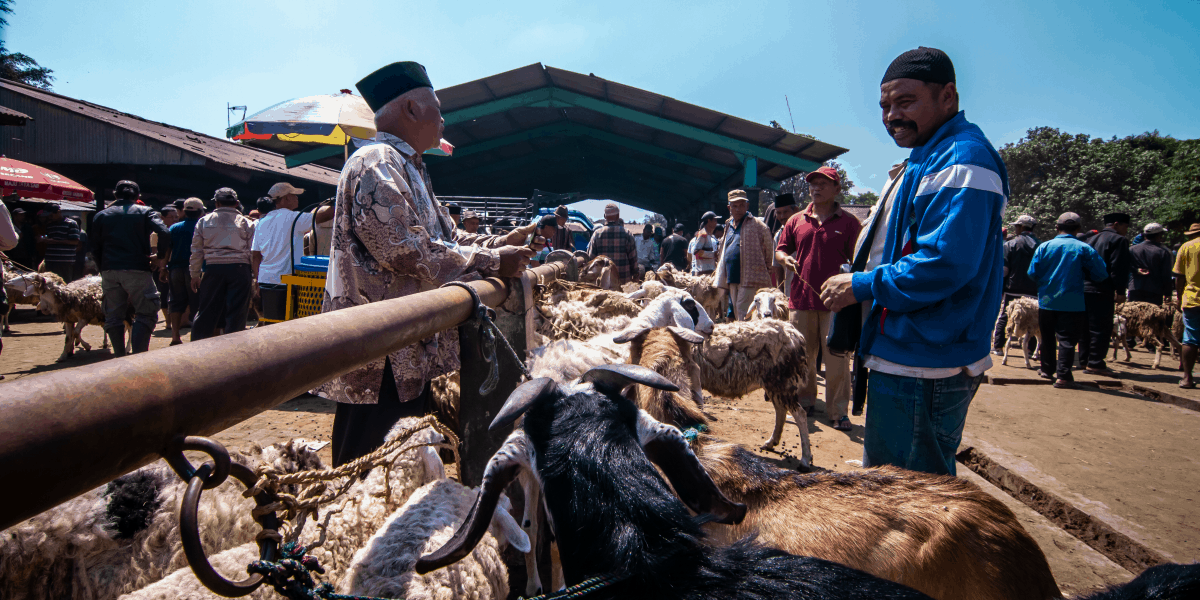Fewer animals will be sacrificed in Indonesia for Eid al Adha due to COVID-19 crisis - official
JAKARTA – Fewer animals will be slaughtered in Indonesia during this year’s Eid al Adha feast of sacrifice due to lower demand from households hit by the economic crisis caused by the COVID-19 pandemic, according to an official at the ministry of agriculture.
The government has prepared 2.1 million local livestock for the feast of sacrifice, consisting of 1,023,854 goats, 649,881 cows, 470,662 sheep, and 18,784 buffaloes, Ketut Diarmita, director general of livestock and animal health at the agriculture ministry, told Salaam Gateway.
“Based on these data, the estimated needs of livestock for Eid al Adha 2020/1441H can be guaranteed fully met from the provision of local livestock. However, there will be a lower number of tails that will be slaughtered this year, due to COVID-19,” said the official.
He said his ministry has been monitoring abattoirs in 34 regions and estimates that there will be a 3.5% average drop in the number of animals sacrificed this year.
“We estimate that 1,802,651 livestock will be slaughtered this year, consisting of 392,185 sheep, 853,212 goats, 15,653 buffaloes and 541,568 cows, 3.5% lower from 1,868,743 livestock last year.”
“This week, we’ll further monitor directly the abattoirs along with central government, local governments, associations, practitioners and universities to ensure preparation in accordance with new health protocol measurements we introduced earlier,” he added.
Eid al Adha will fall on July 31 in Indonesia this year.
NEW HEALTH PROTOCOLS
The agriculture ministry this year introduced a circular number 0008/2020 on qurban slaughtering implementation during the COVID-19 pandemic. The new rules seek to minimise the spread of the virus and demand a minimum of 1 meter physical distancing, temperature screening, use of hand sanitizers for field staff, and using personal protection equipment such as face masks, face shields, and hand gloves.
The new rules are on top of the ministry’s decree number 114/2014 on Eid Adha sacrificial slaughtering that regulates qurban animals point of sale, transport, cages and abattoirs.
“We also created a qurban animal monitoring team and established an online report system, iSIKHNAS, so that authorities, including field staff, can report information during slaughtering such as veterinary public health aspects, animal health, post mortem, and so on in real time,” said Diarmita.
“There will be at least 41 animal doctors and paramedics in the field during the slaughtering process in Jakarta, Bogor, Depok, Tangerang and Bekasi,” he said.
The ministry has also strengthened the network of abattoirs in a bid to move Indonesians away from the traditional practice of using public and pedestrian walkways, to ensure a lower risk of the transmission of zoonotic diseases.
Last year, the government outfitted 24 abattoirs across West Sumatera, West Java, East Java, Papua, Jakarta, Central Java, Banten and West Nusa Tenggara province. New facilities were also to be built in Central Kalimantan and South Sumatera but these were suspended due to a cut in the states’ budgets this year.
“We held a webinar last month with the animal health faculty Institute Pertanian Bogor, the veterinary public health association (Askesmaveti), Indonesia Animal Doctors Association (PDHI), and our province representative office to educate all stakeholders on slaughtering procedures inside and outside abattoirs. We also educate society through infographics on our social media,” added Diarmita.
DIGITAL QURBAN
The government has been advising traders to move all transactions for qurban online to limit the spread of the COVID-19 virus.
“Maybe some of them have already moved online via start-ups or social media. We are considering to develop an online system coordinated by the agriculture ministry to help traders sell online. We will finalize it this week,” Diarmita said.
Gerri Juanda, who heads the Islamic section of e-commerce giant Tokopedia, told Salaam Gateway they are working with nine institutions already approved by the Ministry of Religious Affairs on qurban matters. The nine are Baznas, Dhompet Dhuafa, Eco Qurban, PKPU Human Initiative, Inisiatif Zakat Indonesia (IZI), Lembaga Amil Zakat Nasional Al Azhar, NU CARE-LAZISNU, Rumah Zakat, and Qurban Nusantara.
“Customers can buy and distribute their qurban animal without having to leave home,” said Juanda.
“They will be notified of the status of the animal from purchasing and slaughtering to distribution, via email and in-app notification. Customers can also choose the type of animals and preferred institutions to partner with to process their qurban,” he added.
Tokopedia Salam offers different types of qurban animals, including standard goats (23-28 kg) standard cows (220-250 kg), medium goats (29-34 kg), medium cows (250-300 kg), premium goats (>35 kg), premium cows (>300 kg) and special goats or cows. Juanda said Tokopedia’s online price is more affordable compared to those offered by offline traders.
One street trader for qurban animals in the city of Depok told Salaam Gateway sales are down this year. Mochtar, who in previous years sells around 250 to 500 cows per month, has only sold around 70 tails per month this year. His cows sell from 17 million rupiah ($1,148) for a 250 kg animal. He is considering a move online.
“I think there is still time left (to move online). People are probably receiving their salaries next week so why not (move online)? I also only sell animals from local breeders to help local players like us grow together,” he said.
(Reporting by Yosi Winosa; Editing by Emmy Abdul Alim [email protected])
© SalaamGateway.com 2020 All Rights Reserved
